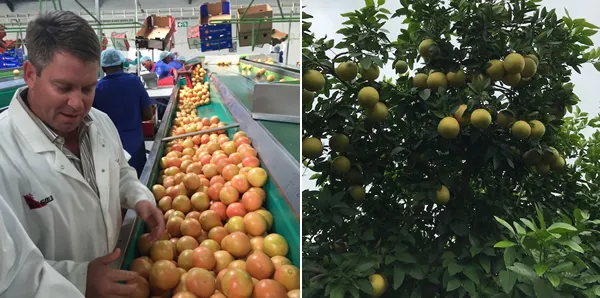South African citrus is currently enjoying good demand on the European market. However, phytosanitary regulations, logistical problems, and increased demand from other markets make it increasingly difficult for European importers to obtain trade. Dole Europe's Tjeerd Hoekstra and Menno Hogenelst take stock of the situation.
"South Africa still needs Europe for 40% of its citrus sales, that's a significant share. Yet, there's increasing demand from other markets, like Asia and the Middle East. They want nice, clean products, and while they don't take Europe's volumes, they give more commitment when it comes to prices. Nevertheless, it's also true that if a market like the Middle East is just slightly oversupplied, it's under pressure for longer," Tjeerd begins.

Delays, the new normal
"There are also as many logistical issues as ever. Costs still haven't returned to pre-pandemic levels, and delays are commonplace. Restrictions on ships' sailing speeds to reduce CO2 emissions aren't helping either. Cold treatment rules cause many delays in ports, too. Before, you could fully load boats from stock."
"Now, they often cannot be loaded because the fruit must still be cold treated. These 'minor' logistical problems have a big effect. Ships used to take two to three weeks; nowadays, it's four to five. But let's not dwell on the past; we must adapt to the new world's prevailing standards," says Tjeerd.
"Black Spot and False Codling Moth interceptions, which have considerable consequences, also still plague the market. Exporters must start pre-determining which farms are doing things like spraying as are thus suitable for Europe. That could mean exporters who send, say, 200,000 boxes and who get blacklisted.
"That could be because of an interception, and so they have much less volume available for Europe. That makes for a very vulnerable, unpredictable market. There seems to be enough volume available, but no one can say for sure whether the market will have enough. A few interceptions could cause a major shift," Tjeerd continues.
South African growers in a tough financial position
"South African growers and exporters all had a tough last year. Surveys show that as many as 80% of growers suffered losses, so there's enormous pressure. There are many farms for sale. Yet, volumes keep growing, given all the new plantings and especially lemons and certain mandarin varieties coming into full production. The Rand is also at an exchange rate level it hasn't been for years, an extremely welcome situation for South African shipping agents."
"The grapefruit season got off to a much better start than last year when there was zero interest in this import fruit for the first three weeks. This year, it sold well from the very start. This week, for the first time, prices are dropping slightly from between €18 and €20 to €16-€17, which we think is still good."
"Cost prices, however, aren't much lower. Our growers are, thus, leaving more grapefruit on the trees to level the season out and spread the supply more. Still, few people eat grapefruit, and that number isn't rising. Plus, unlike, say, oranges, it's not an impulse purchase item; only enthusiasts buy grapefruit," admits Tjeerd.
"The orange market is also hot, with the first Navels being welcomed with open arms. That's true every year, only now, with undoubtedly fewer Spanish oranges available, Southern Europe, too, is already showing interest in imported fruit. The Egyptian Valencia season is also ending. That's all affecting prices."
"South Africa, therefore, wants good money and will get it in the season's first weeks. However, the Navel-growing region, in particular, has had unusual amounts of rain, causing a two-week delay. In Zimbabwe, the cold nights are providing quality, good-colored oranges," Tjeerd states.
Empty, demand mandarin market
"Mandarins face the same climate conditions and delays," adds Menno. "South Africa started mandarin exports about two weeks later. What works in that country's favor is the significantly lower volumes South American countries sent to Europe. South America perhaps benefited the least from the sea transport cost drop and is increasingly looking for markets close to home."
"However, there's also good demand for new varieties that meet the customer needs in the Middle and Far East. The European market, a demand one, is fairly empty. That will continue for some time. The only question is how much volume will be shipped shortly, and perhaps more importantly, how much volume will reach the market at one time. You must pick mandarins, even more than oranges and grapefruit, at the right time," says Menno.
The South African lemon supply to Europe also got off to a slow start this year. "Of all the citrus, lemons are perhaps most susceptible to Black Spot, hence the qualms about exporting them to Europe. Nonetheless, when South African lemons are on the market, they're quickly preferred to Spanish Verna lemons. Argentina, too, is exporting considerably less so far."
"That's because the drought there has created a surplus of small, non-exportable sizes. That benefits the good pricing of South African lemons, which started at between €17 and €21. Incidentally, South Africa also presently has a shortage of large sizes. For now, however, demand should be good," Menno concludes.
 For more information:
For more information:
Tjeerd Hoekstra / Menno Hogenelst
Dole Europe
29 Spectrumlaan
2665 NM, Bleiswijk, NL
Tel: +31 (0) 102 448 418
Email: menno.hogenelst@doleeuropebv.com
Email: tjeerd.hoekstra@doleeuropebv.com
